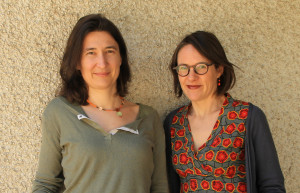Anne Solaz and Ariane Pailhé
tell us about men’s and women’s participation in household and parenting tasks

Ariane Pailhé and Anne Solaz are INED researchers; both study relations between family life and work life, and divisions of labour within couples. Ariane Pailhé is also interested in labour market inequalities by sex and/or ethnic origin, and Anne Solaz in fertility and the economic effects of divorce.
(Interview conducted in April 2014)
Why study amount of time spent on household tasks?
Imbalances in household task sharing are at the heart of inequality between men and women. Despite women’s increased labour market participation, they still devote twice as much time as men to parenting and other domestic activities. The fact is that being under heavy domestic constraints can interfere with looking for a job, reduce the time one has for doing paid work, limit one’s availability at work and chances of promotion. Conversely, the fact that women often work fewer hours than men means they more often end up being responsible for housework and parenting tasks, and it keeps them in that role. Labour market inequalities are therefore closely linked to unequal sharing of household tasks. Men continue to be involved first and foremost in the occupational sphere whereas women are still responsible for the private sphere. This imbalance can adversely affect women’s wellbeing, weighing on them psychologically and giving rise to feelings of being overwhelmed or a sense of injustice.
How do you measure time spent on domestic work?
"Time-use" surveys measure the time spent on different activities. A random sample of households is drawn up, and each household member indicates all the activities he or she does during the day (in French surveys, time is divided into 10-minute segments), detailing the type of activity; for example, "preparing meals," "DIY" or "having friends over." The total time an individual spends on domestic work is the sum of time spent on each of these household activities. Time-use surveys also allow for calculating national-level daily averages for men, women and other population categories. Surveys last an entire year, so as to take seasonal variation into account, and cover all days of the week, to take into account weekday/weekend-day variation. France’s most recent time-use survey was from September 2009 to September 2010. Time-use surveys are conducted in a great many countries using very similar methodology, thereby making international comparison possible.
What long-term developments have been observed?
Over the last 25 years men have become more involved in child rearing while their participation in housework remains stable. Women too are spending more time on parenting activities-and considerably less on housework. They have been gradually disinvesting their housekeeping role to devote more time to their child-rearing role. Gender-based differences in the nature of tasks done have not changed much: women continue to do the more repetitive, routine tasks like cooking, laundry and housecleaning whereas men continue to do tasks that can be organized around availability such as DIY or food shopping.
The change in amount of time spent on housework is due above all to changes in behaviour that reflect lowered demands for daily home maintenance. Due to time constraints, homes are probably less orderly and clean than they were 25 years ago. Women’s occupational advances and changes in family structure have obviously also played a role in these changes, but a lesser one. Whereas traditional household task specialization within the couple, specialization linked to a situation where men were the only income-earners, has decreased, there is still considerable resistance to more equal sharing of household tasks. Women are still the ones responsible for keeping house and making sure that family members too are well kept or kempt. However, there is greater intra-couple balance now when it comes to taking care of the children. Fathers who do no parenting tasks at all have become a rarity. This attests to a change in norms for fathers’ involvement in their children’s daily lives, involvement to which we attribute greater value today than in the past.
